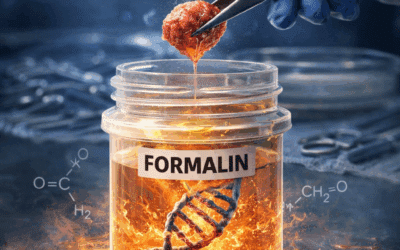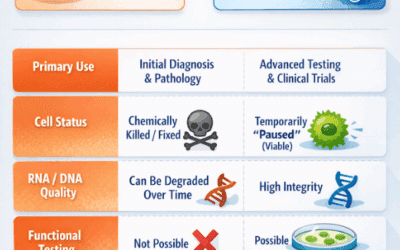Blog
SpeciCare
For more than 35 years, Ken Dixon, M.D., FACS, a surgeon with Surgical Oncology of Northeast Georgia, has treated cancer patients in his practice located in Gainesville, Ga. After a lifetime taking care of cancer patients, and telling a patient or a family member ‘there is nothing left to do’ Dr. Dixon began a journey to do more. Hear more of Dr. Dixon’s thoughts directly from him from this blog.
FFPE vs Cryopreservation – A Biopsy Guide for Cancer Patients
FFPE vs Cryopreservation - A Biopsy Guide for Cancer Patients Key Takeaways Standard Care: Most hospitals use FFPE (Formalin-Fixed Paraffin-Embedded) as the default preservation method. Preservation Limits: The chemicals in FFPE can damage DNA and RNA, potentially...
FFPE Tumor Preservation Kills DNA & RNA
FFPE Tumor Preservation: The Chemistry That Can Limit Your Advanced Cancer Testing Options Introduction When you are facing a biopsy, your mind is likely focused on the diagnosis: Is it cancer? However, a critical event happens the moment that tissue leaves your body...
Take Control of Your Cancer Biopsy for Better Treatment Options
The Biopsy Trap: When Your Sample Gets Used Up Too Fast Quick Takeaways Tissue exhaustion occurs when a biopsy sample is too small to complete all necessary tests. Standard hospital processing (FFPE) often uses up significant portions of the sample for initial...
FFPE vs. Cryopreservation for Cancer Biopsy Tissue
FFPE vs Cryopreservation What Patients Should Know Before a Biopsy URL Slug: ffpe-vs-cryopreservation-biopsy-guide Meta Title: FFPE vs Cryopreservation: Guide for Cancer Patients Meta Description: Understand the difference between FFPE and Cryopreservation before your...
Your Cancer Biopsy Holds the Key
Don’t Let Your Biopsy Become Obsolete Why Tissue Preservation Is Your Best Defense When you are facing a biopsy, your mind is likely focused on one thing: "Is it cancer?" It is a heavy, overwhelming moment. However, there is a second question that is just as vital for...
Cancer Biopsy Options
Cancer Biopsy Options Why Cryopreservation is the New Standard URL Slug: /cancer-biopsy-options-cryopreservation/ Meta Title: Cancer Biopsy Options: Why Live Tissue Preservation Matters Meta Description: Explore cancer biopsy options like cryopreservation. Learn how...




